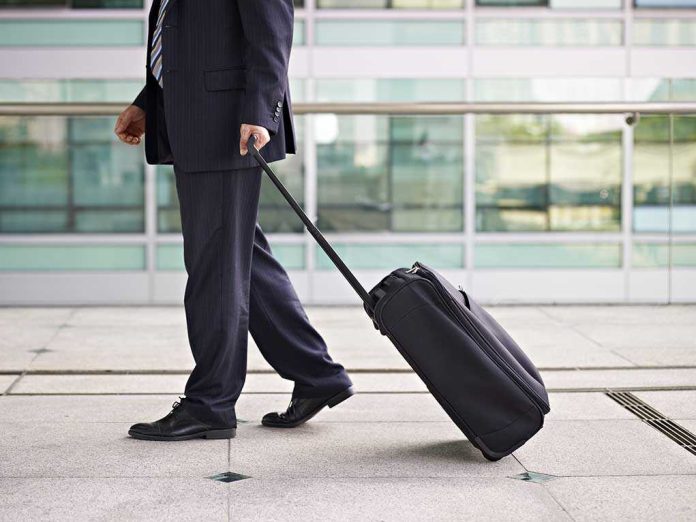
One man’s pocket-size gadget sparked chaos, fear, and a mass exodus in one of Australia’s busiest airport lounges—exposing a hidden threat travelers rarely consider until it’s too late.
Story Snapshot
- A power bank exploded in a man’s pocket at Melbourne Airport’s Qantas lounge, igniting him and forcing the evacuation of 150 people.
- The incident spotlights the real dangers of lithium-ion batteries in public spaces and the urgent need for tighter airline safety policies.
- Airlines and regulators are now under pressure to revise rules and ramp up passenger awareness about battery-powered devices.
- This event could accelerate stricter protocols industry-wide, changing how we travel with electronics.
When a Power Bank Turns Deadly: The Melbourne Airport Incident
November 6, 2025, just after 11am, the Qantas business lounge at Melbourne International Airport was humming with the usual energy of business travelers. In an instant, that routine shattered. A man in his 50s, preparing to relax before his flight, suddenly screamed as flames erupted from his pocket. His power bank, a device millions carry daily, had exploded without warning. Witnesses watched in horror as he desperately tried to remove the burning device, suffering burns to his fingers and legs while chaos spread through the lounge.
The emergency was immediate and severe. Lounge staff and bystanders scrambled to help, emergency services rushed in, and alarms echoed. In under a minute, the entire lounge—about 150 people—was evacuated into the terminal. Firefighters battled the stubborn blaze, which spewed acrid smoke and left scorched upholstery. Paramedics treated the injured man on site before transporting him to the hospital. For two tense hours, the lounge—a haven for frequent flyers—was cordoned off, ventilated, and cleaned, as officials checked every inch for lingering hazards.
The Hidden Perils of Lithium-Ion Batteries in Public Spaces
Lithium-ion batteries power our phones, laptops, and power banks. Yet, these batteries operate on a razor’s edge—if damaged, poorly manufactured, or exposed to heat, they can enter thermal runaway, rapidly releasing energy that can ignite fires or cause explosions. The proliferation of portable electronics has led to a rise in battery-related incidents. Previous scares on planes have already driven airlines and regulators to tighten rules. Emirates and Virgin Australia both recently revised policies on spare batteries, and now Qantas is expected to follow suit.
This was not just a technical issue but a public safety emergency. The Melbourne incident happened in a crowded lounge, not mid-air, but the risk was no less real. If such an explosion occurred on a plane at 35,000 feet, the consequences could be catastrophic. That’s why airlines have begun equipping aircraft with specialized containment bags and training crews for these emergencies. Experts warn that water alone won’t extinguish lithium fires—specialized knowledge and gear are needed to keep travelers safe.
Regulatory Wake-Up Call: How Airlines and Authorities Are Responding
Qantas responded swiftly, confirming the incident and assuring the public that updates to its battery policies are imminent. The lounge reopened after just two hours, but the incident left an indelible mark. Qantas, airport authorities, and regulators now face questions: Are current policies strict enough? Is passenger awareness sufficient? Should certain devices be banned entirely from cabins and lounges, or is containment and education the better path?
Firefighters and aviation safety experts are weighing in. Some call for outright bans on high-capacity batteries in public transport settings, while others advocate for more robust containment measures and better passenger education. The incident has also reignited debates among industry leaders about the adequacy of current regulations. Airlines and airports may need to double down on crew training, invest in more advanced fire containment tools, and overhaul how they communicate risks to travelers.
Broader Implications: The Future of Travel in the Age of Battery Risk
The shockwaves from Melbourne are rippling far beyond one lounge or airline. Passengers are waking up to the hidden dangers in their pockets and carry-ons. Airlines face economic fallout from disrupted operations, while regulators confront political pressure to act decisively. Socially, anxiety over travel safety is rising, and conversations about responsible device usage are taking center stage. Manufacturers, too, will likely see increased scrutiny and regulatory hurdles, as the public demands safer, smarter battery technology.
Travelers now find themselves caught between convenience and caution. Will new policies mean more security checks, restricted devices, or just more warnings in the fine print? This incident may mark a turning point, propelling the industry toward stronger safeguards and a new culture of battery safety—a change that could affect every traveler, every flight, and every lounge worldwide.
Sources:
7NEWS: Exploding Power Bank Burns Man, Forces Evacuation at Melbourne Airport
WBZ NewsRadio: Man Burst Into Flames In Airport Lounge, Leaving Other Passengers Horrified







